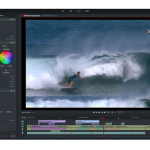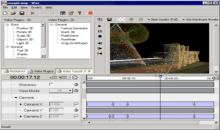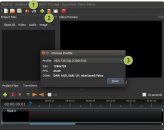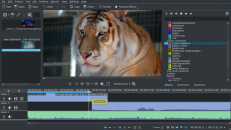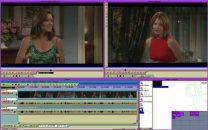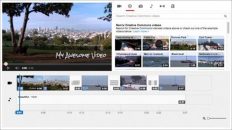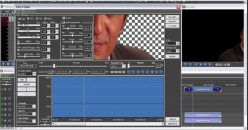Blender Software Review
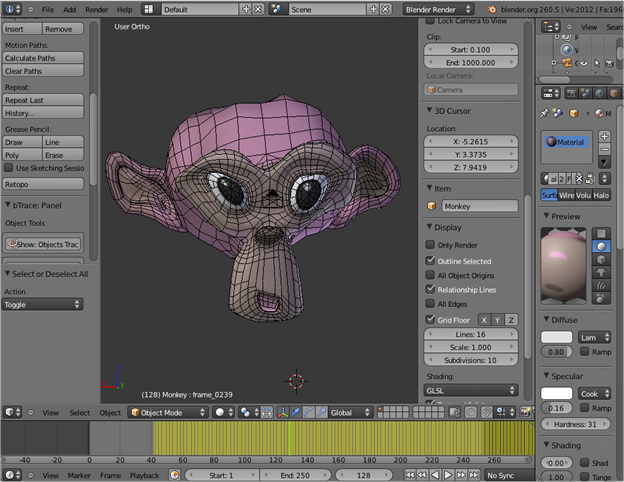
When it comes to video editing, you can use different kinds of software. One of the best free software you can use is Blender. This is a 3D graphics tool for creating animated movies, 3D applications, video games and visual effects. The program offers features such as 3D modeling, rigging, texturing, smoke simulation, fluid, animation, rendering, skinning and video editing.
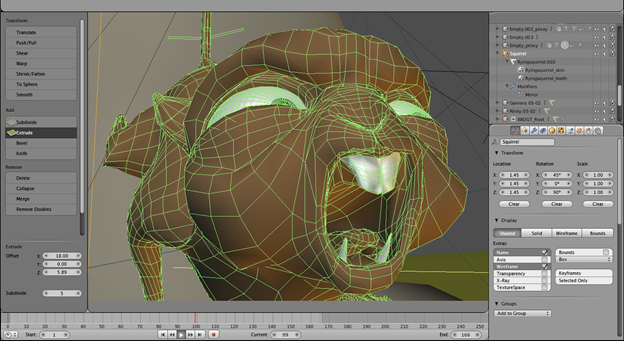
History
Blender was developed by Neo Geo, a Dutch animation studio, as an in-house app. This was done in January 1995, and the primary developer was Ton Roosendaal. The name of this tool was inspired by a song from the album Baby known as Yello. Another company acquired Neo Geo, so Ton Roosendaal co-founded a firm called Not a Number Technologies (NaN) with Frank Van Beek in June 1998. The main aim of this company was to develop Blender further. The software was distributed as a shareware until that time NaN became bankrupt in 2002.
Ton began the “Free Blender” a crowdfunding precursor campaign on 18th July 2002. The aim of the campaign was to open-source the program for a one-time payment of $100,670 (during that time). By September 7th, 2002, they announced that enough funds had been collected and that Blender’s source code would be released. Today the program if offered for free.
Design and Interface
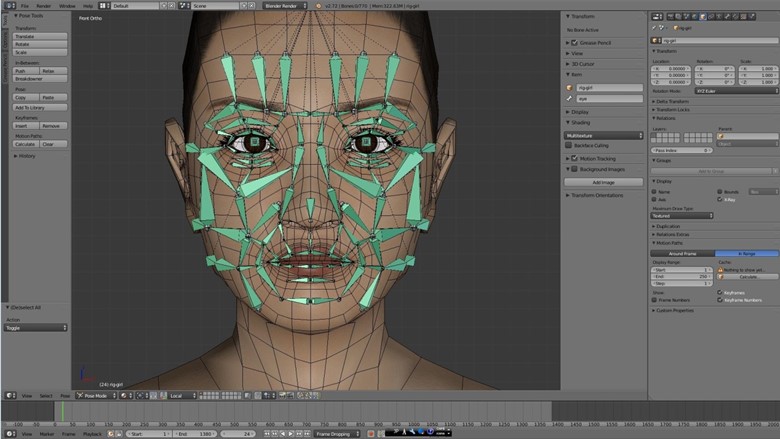
The following concepts are incorporated in the design and interface of Blender:
Modes for editing
There are two main modes of work you will use when using Blender; Objective and Edit modes. These modes can be changed with the Tab Key. The Objective Mode is used to manipulate objects as a unit, whereas the Edit Mode manipulates the actual data of the object. For instance, you can use the Objective Mode to scale, move and rotate the whole polygon meshes and the Edit Mode to manipulate single vertices of a single mesh. You will also find other modes like Weight Paint, Vertex Paint as well as Sculpt Mode.
back to menu ↑Numeric input
Numeric buttons are availed and can be dragged to change their value directly, and you won’t need to focus on a certain widget and being accustomed to using the keyboard. Number and slider buttons may be constrained to different step sizes when you use modifiers like the Shift and Ctrl keys. You can also type python expressions directly into the number entry fields. This allows mathematical expressions to specify the values.
back to menu ↑Usage of hotkey
Many commands you will need while using Blender are accessible through hotkeys. You will also find comprehensive Graphic User interface (GUI) menus.

Workspace Management
The GUI of this program builds its tiled windowing system on one or several windows offered by the platform. One window can be divided into various sections and subsections of different window types. As a user, you can define numerous layouts of the blender windows (screens) and switch between them quickly by choosing from the menu or the keyboard shortcuts. The GUI elements of each window type are controlled using the tools manipulating the 3D viewport.
back to menu ↑Features
Blender software official release for Mac OS, Microsoft Windows, and Linux are available in 32- and 64-bit versions. Some of the standard features you will enjoy while using the software include:
back to menu ↑Fast Modeling
Blender offers a comprehensive collection of modeling tools that make it easy for the user to create, transform and edit models. Examples of such modeling tools include:
- Bridge and grid fill
- N-Gon support
- Keyboard shortcuts that boost the rate of workflow
- Python scripting for personalized add-ons and tools
- Edge slide, dissolve and collapse
Photorealistic rendering
This powerful software now has a robust and unbiased rendering engine known as Cycles. It offers excellent ultra-realistic rendering. The Cycles rendering engine provides:
- HDR lighting support
- GPU and CPU rendering
- Real-time viewpoint rendering
- A permissive license that links with the external software
Fast rigging
Now transforming a model into a character that is posable is easier. This program offers excellent rigging tools such as:
- Easy weight painting
- Skeleton, envelope and automatic skinning
- Mirror functionality
- B-spline interpolated bones
- Colored groups and bone layers for organization purposes
Realistic Materials
The new Blender engine renders endless possibilities for materials. Key features include:
- Open Shading Language support that helps to code unique shaders
- Complete Node Support used for full customization
- Physical accurate shaders such as translucency, glass, and SSS
Toolset for animation
Whether you want to opt for complicated walk-cycles or simple key framing, Blender will allow you to turn your still characters into remarkable animations. The animation feature provides the following:
- Sound synchronization
- Character animation poses editor
- Inverse kinematics for fast poses
- NLA (None Linear Animation) for independent movements
- Automated walk-cycles paths
Fast UV Unwrapping
You can easily unwrap the mesh inside Blender and utilize the image textures or even paint something directly onto the model. This feature allows for:
- Multiple UV layers
- Possibility of painting onto the mesh directly
- UV layout image exporting
- Cylinder, Fast Cube, Camera and Sphere projections
- Angle and conformal based unwrapping (with vertex pinning and edge seams)
Sculpting
By using Blender, you get to experience the fun of sculpting organics subjects such as:
- Mirrored sculpting
- Multi-res sculpting support
- 20 different types of brush
- Mirrored sculpting
- Dynamic Topology Sculpting
Game Creation
Blender has a complete game engine that lets you create a 3D game inside Blender. This game engine includes:
- Ability to harbor models to any 3rd party game engine
- Creating or coding your game logic
- Full Bullet physics integration
- 3D spatial audio with Open AL
- Ability to playback games inside the software without preprocessing or compiling
- Python scripting API used for advanced control
- Support for OpenGL dynamic lighting, animated materials, toon shading, animated materials including parallax and normal mapping.
Full compositor
The program still has a fully built-in fledged compositor. This means that you don’t have to export your work to their part programs. You can do many things without leaving Blender. The compositor comes with:
- Render-layer support
- Multi-threaded
- Render-layer support
- Ability to reduce to multilayer OpenEXR files
- Great nodes color grading, creating camera FX, vignettes and more
Great simulations
Blender will deliver great looking results whether you require rain, fire, crumbling building, smoke, cloth fluid or full on destruction. Simulation tools are:
- Smoke – flowing smoke accompanied by flames & scene interaction
- Fluid – realistic fluid and water simulations
- Hair – gorgeous wafts of hair that can interact with collisions and blow in the wind
- Cloth – excellent cloth simulations for environments and clothing
- Particles – that can be used to create things such as sparks, rain, and shrapnel
- Rigid body physics – meant to make any object collidable and destructible
Object and camera tracking
You will access object tracking and ready camera when using Blender. It lets you import raw footage, mask areas, track footage and have a look at the camera movements live on the 3D scene. This eliminates the need to shift between different programs. The following are included in the object and camera tracker:
- Potent camera reconstruction
- Manual and auto tracking
- Real-time preview of the tracked footage as well as the 3D scene
- Support for Tripod solvers and Planner tracking
Numerous extensions
Blender is loaded with a wide range of extensions that can be used by developers and enthusiasts. Examples of the existing extensions are:
- 3D printing toolbox
- Generators for terrain, trees, clouds, and Ivy
- Rigify meta-rigging system
- Export and import format support for Unreal Game Engine, DirectX and AfterEffects and more
Video editing
An inbuilt Video Editor is included in this program. It lets you do basic actions such as video splicing and cuts, including the complex tasks such as video masking. The editor for videos includes:
- Approximately 32 slots you can use to add images, video, audio, masks, scenes, and effects
- Luma waveform, chroma vectorscope, live preview and histogram displays
- Syncing, audio mixing, waveform and scrubbing visualization
- Transitions, speed control adjustment layers, filters, keyframes and more
Flexible interface
Beginner, as well as advanced users, will enjoy having the ability to customize layouts completely. You will be able to simply split the viewport and fully customize the layout with python scripting. The interface also offers:
- Consistency on every platform
- Crisp text
- Pop-up windows that aren’t disruptive
Supported platforms
Blender is available for Linux, Window Vista, and Mac OSX. When it comes to file formats, Blender has an internal file system that packs multiple scenes into one file known as the “.Blend file”. All of these files are backward, forward as well as cross compatible with other Blender versions, except the following:
The reworked animation subsystem that was introduced recently is somewhat incompatible with the older versions.
The introduction of BMesh caused this change since this new version is more versatile.
All objects, scenes, textures materials, images, sounds, post-production effects of an entire animation may be kept in a single “.blend file.” If you have data loaded things like the sounds and images from other external sources, they can be kept externally and then referenced through a relative or absolute pathname. What’s more, “.blend files” can also be utilized as libraries of the program assets.
Blender organizes information as different types of data blocks like Meshes, Objects, Scenes, Lamps, Images, and Materials, etc. When an object is in Blender, it consists of numerous data blocks. For instance, something users describe as polygon mesh would consist of an object, a Mesh data block, and often a material, and many other things that have been linked together. This way, different data blocks can refer to each other. For example, there can be multiple objects referring to the exact sane mesh. This makes the subsequent editing of the shared mesh causes shape changes on each object that used the exact mesh. Meshes, objects, textures, and materials can still be linked to create other .blend files. This way the files become reusable resource libraries.
Popularity
Blender is very popular software. Many people learn how they can use the program through the online community and discussion forums like Blender Artists. One of the first commercial projects to be created using the free Blender version was Spider-Man 2. This software can be extremely useful as long as you know how to use it properly.
back to menu ↑User friendliness
Even though the Blender interface may seem very difficult to learn, users can still find a way to master it after a while. Almost all functions have a shortcut on the keyboard. A tree overview and color themes are some of the improvements that have come along in the past few years.
back to menu ↑Blender Cloud
Blender’s cloud platform was launched in March 2014 and is run by the Blender Institute. The platform is subscription-based and offers users synchronization and hosting for the animation project files that are backed up. Blender Cloud was launched to fundraise and promote a project that was intended to replace the sale of DVDs with a subscription model that can host file, share assets and collaboration.
back to menu ↑Blender ID
This is a unified login ideal for service users and Blender software. Using Blender ID, you can log in to the Blender Store, Blender Cloud, the Blender Conference, Blender Development Fund as well as the Certifies Trainer Program offered by the Blender Foundation.
back to menu ↑Support
When you visit the Blender site, you will realize that the program is documented extensively. The team also offers support via discussion forums and community tutorials online. Their staff provide social and support services for all Blender Professionals. Moreover, you can also find many excellent video tutorials on YouTube for booth professionals and amateurs for free.

